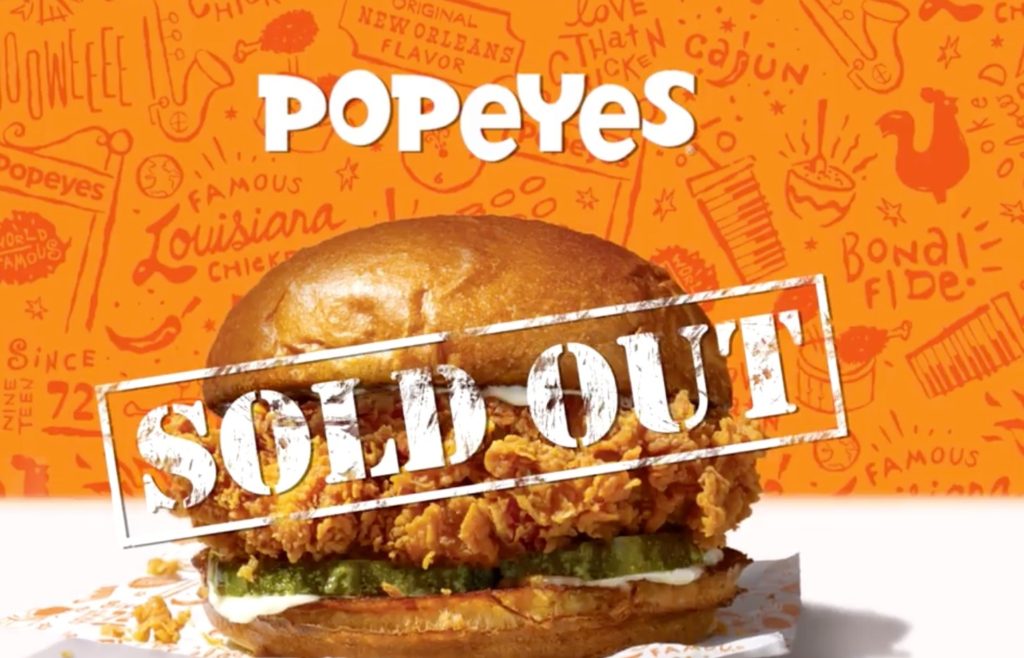

In August, Popeyes Louisiana Kitchen took the fast food industry by storm when it launched its new fried chicken sandwich. The launch didn’t make too much noise until Popeye’s rival, Chick-fil-A, engaged in some friendly competition by tweeting that its fried chicken sandwich recipe was “the original.” Popeye’s response to Chick-fil-A, “…ya’ll good,” was a crowd favorite, receiving more than 85,000 retweets and 300,000 likes on Twitter. This social media frenzy encouraged many fried chicken fans to go out and purchase the revolutionary Popeye’s fried chicken sandwich. Soon after, Popeye’s announced that its fried chicken sandwich was sold out.
Among these fried chicken fans was Craig Barr, who claims that he spent “countless time driving” from one Popeyes to another in search of the beloved fried chicken sandwich, but was informed by each restaurant that the sandwich was sold out. After this incident, Barr filed a lawsuit against Popeyes in Hamilton County General Sessions Court, alleging that the restaurant engaged in false advertising and deceptive business practices. Further, Barr alleges that Popeyes intentionally overhyped the sandwiches and provided insufficient quantity in order to increase the restaurant’s popularity. In the court documents, Barr also alleges that he was “hustled out of $25.00” by a man who claimed in a Craigslist advertisement that he worked for Popeyes and could get Barr a fried chicken sandwich. Further, Barr stated that while driving to one of the Popeyes locations, his car suffered tire and rim damage, costing him $1,500 in repairs. As a result of these allegations, Barr, who is representing himself in the case, is seeking $5,000 in damages from Popeyes.
The Tennessee Consumer Protection Act
Consumer protection laws are enacted to safeguard the well-being and interests of consumers by ensuring that businesses are held accountable. An example of a consumer protection law is The Tennessee Consumer Protection Act (TCPA). The TCPA has two main provisions, the first being the prohibition of unfair and deceptive acts or practices affecting any commerce or trade. Second, the TCPA includes a list of specific acts which are considered to be deceptive acts and practices. The list of deceptive acts that violate the TCPA is broad in scope, although luckily for Barr, it includes, “[a]dvertising goods or services with intent not to supply reasonably expected public demand, unless the advertisement discloses a limitation of quantity.”
Will Barr Succeed in Court?
Under the authority of the TCPA, any person who suffers loss of money or property as a result of an unfair or deceptive business practice or practice declared to be unlawful by this Act may sue to recover damages. Therefore, in order to be successful in his case, Barr would first need to prove that Popeye’s intended to supply an insufficient quantity of fried chicken sandwiches to meet the reasonably expected demand of customers. Second, Barr would need to show that Popeyes did not disclose a limitation of quantity in its fried chicken sandwich advertisement.
Barr may have difficulty proving that Popeyes could have reasonably expected this fried chicken sandwich frenzy. The demand for fried chicken sandwiches was so great that hour long lines were reported at some Popeyes locations, and there was even a fried chicken sandwich being sold for $7,000 on eBay. Further, in an official statement, Popeyes stated: “The demand for the new chicken sandwich in the first few weeks following launch far exceed our very optimistic expectations. As a result, Popeyes restaurants across the country are expected to sell out of the chicken sandwich.” Therefore, because it seems like Popeyes did not expect this fried chicken craze when initially advertising its sandwich, Barr may have an uphill battle in court.
Although, Barr’s case is not completely hopeless, as Popeye’s advertisement did not disclose that there would be a limited quantity of sandwiches. When it announced the sandwich’s launch in early August, Popeyes gave no indication that it would be a limited time offer, known in the fast food industry as an “LTO.” Therefore, Barr can still bring suit under the TCPA.
Conclusion
Ultimately, it will be up to the judge or jury to decide whether Popeyes could have reasonably expected this fried chicken frenzy. Although, it may be difficult for Barr to prove that Popeyes plotted to run out of their new sandwich.
Sources
Amanda Jackson, Popeyes Chicken Sandwich is Officially Sold Out – for Now, CNN Business (Aug. 28, 2019).
Arriana McLymore, Popeyes Spicy Chicken Sandwich Launch Heats up Social Media, Reuters (Aug. 23, 2019).
Consumer Protection Guide for Consumer Affairs Counselors and United States Military Servicemembers, Tennessee Attorney General’s Office Consumer Advocate and Protection Division, (Sept. 13, 2019).
David Yaffe-Bellany, A Popeyes Chicken Sandwich and a Tactic to Set Off a Twitter Roar, New York Times (Aug. 21, 2019).
Hillary George-Parkin, Why Popeyes is Still Out of Fried Chicken Sandwiches, Vox (Sept. 6, 2019).
Janelle Griffith, Tennessee Man Sues Popeyes for Running Out of Chicken Sandwiches, NBC News (Aug. 30, 2019).
Mark Pace, Chattanooga Man Sues Popeyes for Running Out of Popular Chicken Sandwich, Times Free Press (Aug. 29, 2019).
Micheline Maynard, Popeyes, Which Created a Fried Chicken Sandwich Frenzy, is Now Sold out, Forbes (Aug. 27, 2019).
Tenn. Code Ann. § 47-18-109(a)(1) (2019).
Tenn. Code Ann. § 47-18-104(a)(10) (2019).
Photo courtesy of The Dallas Morning News.

